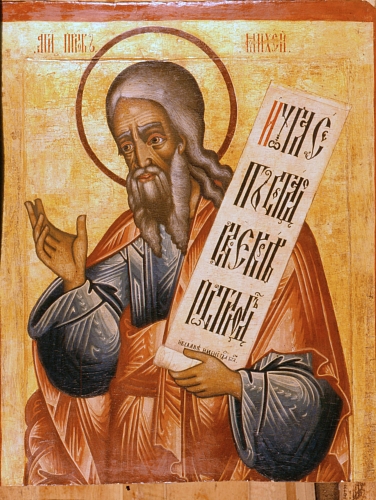 Father Pat Griffin concludes his series, Considering Consecrated Life, with a final post dedicated to Honoring our Prophets.
Father Pat Griffin concludes his series, Considering Consecrated Life, with a final post dedicated to Honoring our Prophets.
This week, we come to the end of the Year of Consecrated Life, but its blessings continue. Along that line, the scripture readings from this past Sunday drew my attention to the prophet. That role seemed like a good image to carry forth for our mission and our Vincentian charism.
Two weeks ago (on the Third Sunday in Ordinary Time), the Gospel was the passage from Luke which carries the phrase which became the motto of the Congregation of the Mission: “He has sent me to preach the Gospel to the poor.” The text for this past Sunday follows immediately upon that proclamation. They qualify each other.
 Jesus says that “a prophet has no honor in his native place.” We know what that means. We have probably used that expression ourselves to reflect our own experience or describe that of another. In our native place, in our homes, we are “known.” People remember our family, where we came from, and all the mistakes which we have made. It is difficult for those who know us well to see us differently from how they have always thought about us. It was the same with Jesus. We see numerous times in the Scriptures where his background is raised as a means of dismissing him.
Jesus says that “a prophet has no honor in his native place.” We know what that means. We have probably used that expression ourselves to reflect our own experience or describe that of another. In our native place, in our homes, we are “known.” People remember our family, where we came from, and all the mistakes which we have made. It is difficult for those who know us well to see us differently from how they have always thought about us. It was the same with Jesus. We see numerous times in the Scriptures where his background is raised as a means of dismissing him.
- When it is recalled that he comes from Nazareth, the question is asked “can any good come from Nazareth?” (Jn 1:46).
- When his kinfolk listen to him preach, they ask themselves: “Where did this man get such wisdom and mighty deeds? Is he not the carpenter’s son? Is not his mother named Mary and his brothers James, Joseph, Simon, and Judas? Are not his sisters all with us? Where did this man get all this?” (Matt 13:54-56).
- When he offers forgiveness, they ask where he got such a right: “Who is this who even forgives sins?” (Lk 7:49).
- “When his relatives heard of this [Jesus’ power over demons], they set out to seize him, for they said: ‘He is out of his mind’.” (Mark 3:21)
Rather than listen to what Jesus has to say, people prefer to find excuses for not listening to him and discounting his presence as well as his mission. Too often, Jesus was treated without honor by those who could have known him best and been most attracted to his words.
The situation can remind us of our responsibility to give honor where it is due. Perhaps we are prompted to ask where we deny respect to those who deserve it from us or how we act badly when we should be most enlightened. What do you think? Can you think of any examples in your life from those who surround you or look to you for affirmation and encouragement? Who are the one who raise the questions, even if they do not know all the answers? Who are the ones who point out the direction, even if they do not know all the details of the route or destination? Who are the ones who are willing to begin the task, even if they alone will not be able to bring it to completion? Who are the prophets among us? They do not need to be the smartest of us or the most talented!
Let me be clear on the role of a prophet. A prophet does not foretell the future as if by some mystical power. A prophet studies the past, then looks at the present, and sees where our choices will lead us. He/she recognizes how our current direction can lead to loss and danger, or growth and blessing. A prophet is a student of our ongoing situation with open and attentive eyes.
Pope Francis has taken up the role of prophet among us. His encyclical Laudato Si’ draws the clear connection between the oppression of the poor and the care for our environment. His writings around the family, mercy and the consecrated life (and many other topics) have an affirming and challenging tone which should draw our attention and action.
In the first reading from this past Sunday, Jeremiah writes about the character of a prophet:
For it is I this day
who have made you a fortified city,
a pillar of iron, a wall of brass,
against the whole land:
against Judah’s kings and princes,
against its priests and people.
The prophet has a resolute voice which speaks out fearlessly. He/she becomes “the fortified city,” the “pillar of iron”, the “wall of brass” who, as the Quaker saying goes, “speaks truth to power.”
As Vincentians, as consecrated persons, we need to grasp the role and responsibility of prophets. This means that we need to hear them when they speak among us and we need to be them when we must speak. Make no mistake: prophets are often troublesome and difficult to work with, but that does not make their/our message any less important or immediate. Called to preach the Gospel to the poor, we ask God’s blessing both on our listening and on our proclamation.
Note: On February 2nd, we come to the end of the “Year of Consecrated life,” and thus to this series of essays. Look for more from Fr. Patrick Griffin on new Catholic and Vincentian themes.





0 Comments